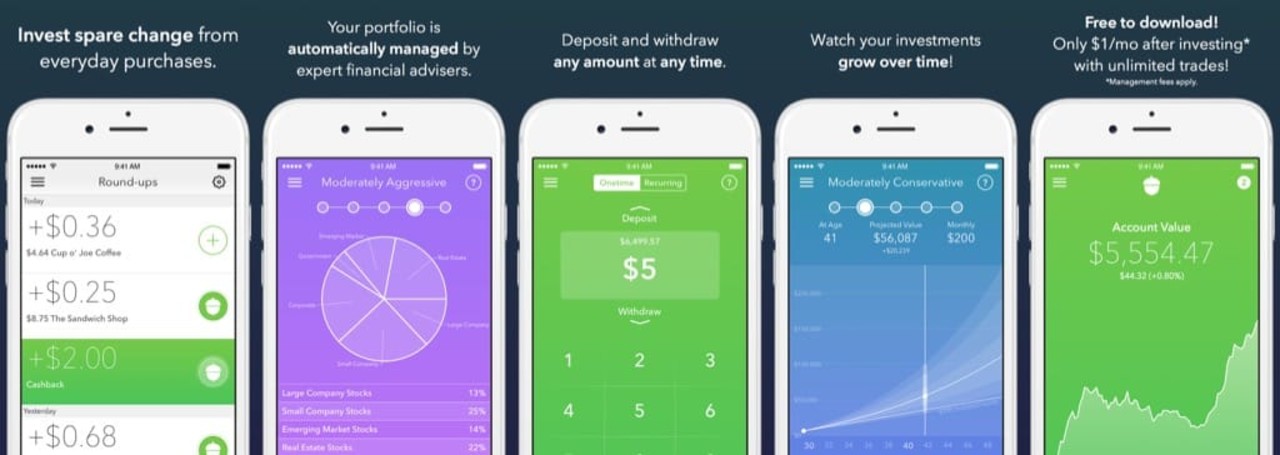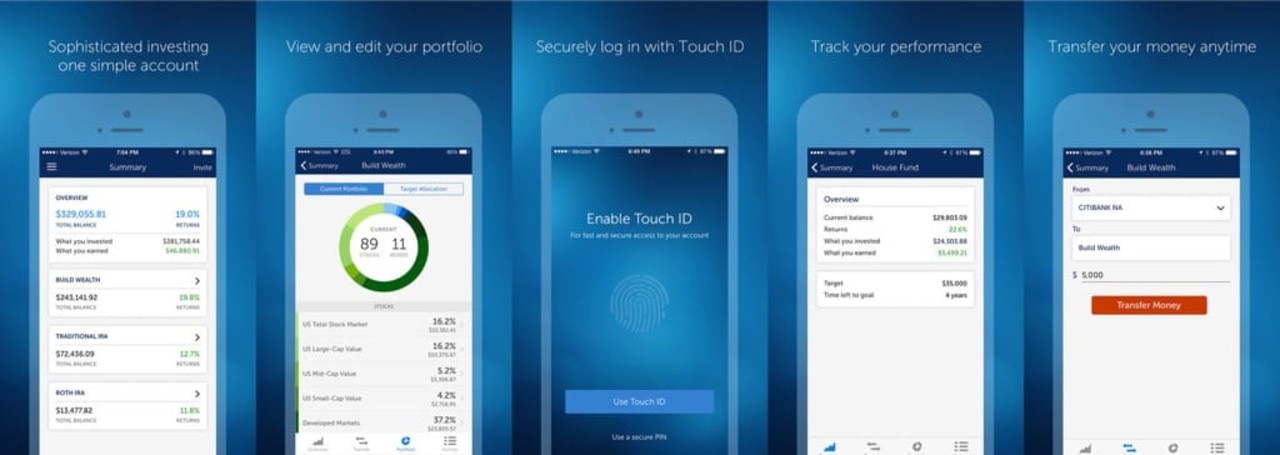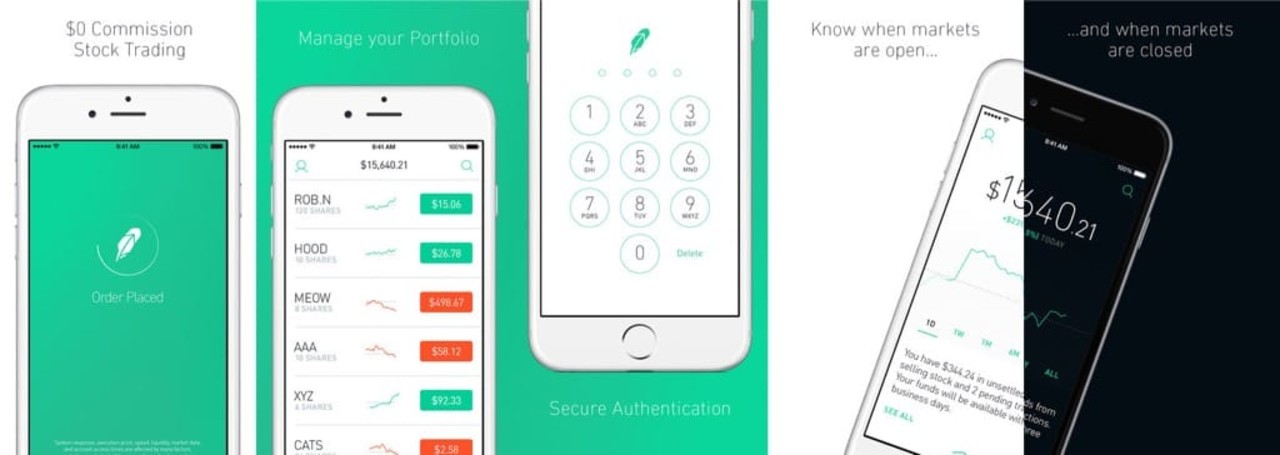Financial Planning and Investment Apps that Don't Suck
• filed under software • permalinkI’m always looking for a new tool, app or service that can give me a leg up when it comes to investing and making it as painless as possible which is why I’m covering three tools that can help you invest and save with minimal effort.
Acorns

They get their name from the same idea that squirrels have: when you find an acorn, you bury it in the ground and save it for winter. In this case, however, we’re not burying our money when we have extra change, we’re investing it. Acorns is an iOS and Android app that allows you to take the spare change from each of your regular purchases you make on a debit or credit card and invest it.
For example, You spend $5.49 on coffee on Monday morning so you roll up that $5.49 to $6.00 and the remaining $0.51 is invested. You can do this automatically via the app or on your own, if you wish. It’s easier to think about than it seems because once you get into the habit of expecting all your purchases to be rounded to the next dollar, it’s cake. Personally, I do it manually, and that might work for you as well. They require minimum deposits of $5.00 so once your roll-ups reach that amount, a deposit will occur into your Acorns account (if you do it automatically). You can also have Acorns make regular deposits as well on a recurring basis if you so desire. You can even deposit your cashback you get on your credit cards!
Acorns offers five different investment plans, with each one having a unique blend of stocks (via ETFs) and bonds, depending on your style. If you’re looking for growth, a more aggressive plan will be more to your liking, while a conservative plan is better for keeping your capital locked in on a slow but steady path. You can use the app to determine how much your money might grow over time with their projection graphs and see how your money is doing on the home screen day by day. As an added bonus for Android users, you can see your account’s value in real time via their widget on your home screen! As an iPhone user, this is something that I’m actually very envious about.
Acorns is free on both iPhone and Android and takes roughly two business days to be fully signed up as they are an investment firm and have to follow the same rules as everyone else. They’re also open only to users within the United States (as they need a social security number).
Betterment

If you’re looking for a long-term play and want a platform that can help you do some serious investing, Betterment is the game you want to play. Signing up is dead simple and their plans help you find a good place to start putting your money. On their homepage, all you need to do is punch in your age, if you’re retired, and how much you make, and they’ll cook up three awesome plans for you to choose from, starting with saving to create an emergency fund/nest egg. Having one of these is important as sometimes life happens and one should never rely on credit cards.
Once you’re signed up and verified, you can browse your account on their site or using their mobile app. Their plans are similar to Acorns in that your money is automatically allotted into specific categories of ETFs based on how the money is to be treated.
One thing to make sure I note is that unlike Acorns and RobinHood, Betterment does have a fee structure that you should be aware of, even though it’s super small and if you’re actively investing, you’ll barely notice. Their fee structure is based on your investment amount and they even provide an equivalent cost per month in real dollars and cents. For someone investing under $10,000 to start, they’ll be looking at an annual rate of 0.35% or roughly one dollar per month. This entry level plan requires a minim $100 auto-deposit every month. If you’re not comfortable with that yet or just don’t have the cash to make that kind of deposit, yet, don’t worry. Betterment assesses a flat fee of $3 per month for accounts with deposits of less than $100.
At $10,000, an investor can see the annual rate drop to 0.25% which will run roughly two dollars per month. (It’s important for me to note that the lower rate doesn’t start until $10,000 so an investor with $9,999 will be subject to the higher 0.35% minimum rate.) If you’re an investor who might be rolling in it and is working with $100,000, the rate drops again to 0.15% or roughly $13 per month.
With each step to higher better pricing structures, you’ll be offered additional services such as Tax Loss Harvesting ($50,000 minimum) and a personal advisor ($500,000 minimum).
For those who are unsure about the whole idea, rest easy with a 30-day no-cost intro option. At the end of 30 days, you’ll be placed into a plan based on your deposit status during the 30-day window.
The Betterment app is available for free on the Apple App Store and Google Play Store.
RobinHood

RobinHood is probably the slickest of the three app-services I describe here, today. One thing that’s plagued investors for a long time is that every time you make a trade, you have to pay a fee. That’s all fine and dandy if you have tens or hundreds of thousands of dollars you’re moving around at any one time. A $250,000 trade minus $10 is nothing (0.004%, to be exact). For those who have smaller portfolios, say around the $1k to $10k range, those $10 fees add up ($10 from $1000 is 1%, a 250x increase). RobinHood’s goal is to stop making that a problem. They make their money off of you being their customer, so they don’t really need to charge you any per trade. Like Acorns, RobinHood is an app-only service so you can’t trade on your computer (yet). It’s technically not open to the public yet but they have been ramping up their beta enrollment quite a bit as of late. It’s definitely work looking into as it gives anyone with any amount of money access to buy stock without having to worry about losing a large fraction of their money every time they buy and sell.
You can sign up to get yourself on the waiting list at robinhood.com and get the app on the Apple App Store.
Disclaimer
I’m not a financial advisor. I recommend these products and services because I believe they offer a great service for users. Don’t trade with money you can’t afford to lose. All services mentioned above are SEC Registered Investment Advisors. Brokerage services are provided to clients via Acorns Securities, Betterment Securities, and Robinhood Financial, LLC, members FINRA and SIPC. For more details, please see the each company’s disclosures as appropriate: Acorns Securities, Betterment Securities, Robinhood Financial, LLC.